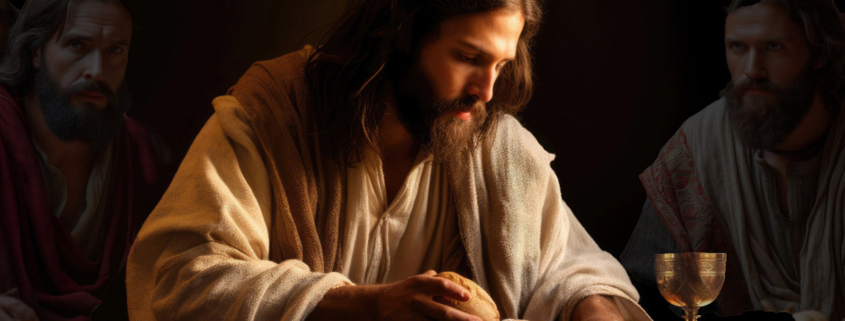Maundy Thursday
The Thursday of Holy Week, the week between Palm Sunday and Easter Sunday, is called Maundy Thursday. The name comes from the Latin word “mandatum” which means “commandment.” The word appears in the Latin translation of John 13:34, where Jesus said to his disciples: “A new commandment (mandatum) I give you: Love one another.” While Jesus truly did give his followers that great command on the night before Good Friday, Maundy Thursday is most memorable for its “suppers.”
Many people are familiar with Leonardo Da Vinci’s painting The Last Supper. In that work of art, Da Vinci portrays the Lord Jesus gathered with his disciples to celebrate the Passover. The Passover meal was an annual festival in Israel held to commemorate how God at the time of Moses delivered Israel from slavery in Egypt. Exodus 12 tells how God, to protect his people from death in Egypt, instructed every Israelite household to take an unblemished year-old male lamb and slaughter it. The Israelites were to paint the blood of the lamb on the doorposts of their homes, and roast the lamb whole and eat it. God promised that when he saw the blood of lambs marking the homes of the Israelites, he would “pass over” their homes and spare them from the death coming upon Egypt.
The Passover meal foreshadowed a far greater deliverance from a far worse slavery through a much better lamb. Just as God saw the people of Israel living as slaves in Egypt and doomed to die there, so he saw all people living as slaves to sin and doomed to die in that slavery eternally. But God had a plan to deliver his people. That plan also focused on a lamb, but not one from the flocks of Israel. This Lamb was God’s own Lamb, his own dear Son Jesus Christ. This Lamb would deliver a world of sinners from their slavery to sin by shedding his blood.
Because the true Passover Lamb had now come to take away the sins of the world, the Passover that Jesus ate with his disciples on Maundy Thursday was indeed the “last supper” of its kind. During that meal, the Lord instituted a new supper to replace the Passover. That new supper is the Sacrament of Holy Communion, or as it is often called, “the Lord’s Supper.” The Bible tells us that Jesus took some of the bread from the Passover meal, gave thanks and gave it to his disciples saying, “This is my body, which is given for you.” He also took a cup of the wine that was used for the Passover and gave it to his disciples, saying, “Drink from it all of you. This is my blood which is poured out for you for the forgiveness of sins.” Jesus made it clear that he wanted his disciples to continue to celebrate this Supper until he returns and brings the world to an end.
So Christians gather often to receive the Lord’s Supper. Together with the bread, Jesus gives us his body that bore the punishment for our guilt. Together with the wine, Jesus gives us his blood that was sacrificed to free us from our sins. Our Lord does this to assure us that the death in hell we deserved has passed over us; through Jesus we have life—eternal life! Indeed, with believing hearts we rejoice to receive the Lord’s Supper often for the tremendous blessings that we have through Jesus: forgiveness of sins, life, and salvation.
And one day, our Lord will invite us to another supper, a wonderful, eternal supper, a supper that the Bible in Revelation 19 calls “the wedding supper” of the Lamb. On Maundy Thursday Jesus had pointed his disciples to this supper, “the Lamb’s supper” — he spoke of his glorious return, and he promised that his faithful disciples will “eat and drink at my table in my kingdom” (Luke 22:30). The Lamb’s supper will take place when Jesus returns in glory to claim the people he redeemed by his death on the cross and bring them home to heaven. Jesus was looking to that day when he promised his disciples: “In my Father’s house are many rooms…I am going to prepare a place for you. And if I go and prepare a place for you I will come back and take you to be with me that you also may be where I am.”
Every year our observance of Maundy Thursday is a reminder of how God delivered us from our sins through his Lamb. Every time we receive “the Lord’s Supper” God assures us of the forgiveness of our sin, and we get a foretaste of “the Lamb’s Supper” that we will enjoy eternally with our Lord at his table in heaven.

